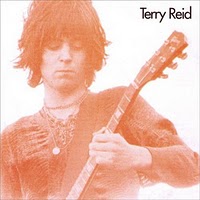 The big deal about Terry Reid is, as legend has it, he was offered, and declined, Robert Plant’s vocalist spot in the New Yardbirds, a group thereafter known as the Led Zeppelin. If you can get past a missed Zeppelin connection and dig his action you’ll understand why he did not need to consider jumping into some upstart and unproven group of New Yardbirds! His voice, flat out, is a powerhouse, and on this, his second album, Terry Reid, is full of heat…he out sings Lorraine Ellison on her classic “Stay With Me Baby”…his voice is simply great, as in great BIG. Even as he’s obviously affected by Steve Marriott (Small Faces) and the Reid vs Plant case COULD be made, Reid’s phrasing is much less Plant’s wholesale Marriott mimic. He has a pleading voice…brimming with feeling that just soars…this is an excellent album by an underrated, and relatively unknown heavy. –Nipper
The big deal about Terry Reid is, as legend has it, he was offered, and declined, Robert Plant’s vocalist spot in the New Yardbirds, a group thereafter known as the Led Zeppelin. If you can get past a missed Zeppelin connection and dig his action you’ll understand why he did not need to consider jumping into some upstart and unproven group of New Yardbirds! His voice, flat out, is a powerhouse, and on this, his second album, Terry Reid, is full of heat…he out sings Lorraine Ellison on her classic “Stay With Me Baby”…his voice is simply great, as in great BIG. Even as he’s obviously affected by Steve Marriott (Small Faces) and the Reid vs Plant case COULD be made, Reid’s phrasing is much less Plant’s wholesale Marriott mimic. He has a pleading voice…brimming with feeling that just soars…this is an excellent album by an underrated, and relatively unknown heavy. –Nipper
Jive Time Turntable
N.W.A “Straight Outta Compton” (1988)
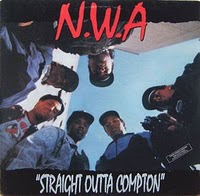 I’ll have to put my vote in as this record being my favorite hip-hop/rap album of all-time. Just like the Sex Pistols and Black Flag before them, this was right in your face and hard to ignore. Comes off a show-stopper, the go for broke style is so real and scary that it makes you feel you’ve been pistol whipped into oblivion, and yet you come back for more. From the superb opener “Straight Outta Compton” to the anger fueled “Fuck Tha Police,” this was hardcore music. Many of the tracks contain some very graphic lyrics, but there is a certain level of playfulness to the album as a whole. Make no mistake, this is not a kids record. It’s gritty subject matter and harsh lyrics bring it to life in a fearsome yet passionate way. Filled with tormented material, “Express Yourself” can be fun at times and “Gangsta Gangsta” is a hell of a song. Ice Cube, of course is the real standout here (even surpassing Dr. Dre). His lyrics and anger are the most dazzling throughout the record (note – he wrote most of the lyrics on the album). I was too young to remember the impact this had on society back in 1988, but today it remains the greatest hip-hop album to exist. –Jason
I’ll have to put my vote in as this record being my favorite hip-hop/rap album of all-time. Just like the Sex Pistols and Black Flag before them, this was right in your face and hard to ignore. Comes off a show-stopper, the go for broke style is so real and scary that it makes you feel you’ve been pistol whipped into oblivion, and yet you come back for more. From the superb opener “Straight Outta Compton” to the anger fueled “Fuck Tha Police,” this was hardcore music. Many of the tracks contain some very graphic lyrics, but there is a certain level of playfulness to the album as a whole. Make no mistake, this is not a kids record. It’s gritty subject matter and harsh lyrics bring it to life in a fearsome yet passionate way. Filled with tormented material, “Express Yourself” can be fun at times and “Gangsta Gangsta” is a hell of a song. Ice Cube, of course is the real standout here (even surpassing Dr. Dre). His lyrics and anger are the most dazzling throughout the record (note – he wrote most of the lyrics on the album). I was too young to remember the impact this had on society back in 1988, but today it remains the greatest hip-hop album to exist. –Jason
The Band “Stage Fright” (1970)
 It’s from the opening track that this is a faster, looser Band. “Strawberry Wine” is a quick, clumsy, lighthearted song—hardly “Tears of Rage,” that’s for sure. And there are plenty of such moments here, where the Band is honky tonkin’ their way through casual structures and tossed-off lyrics. The production, too, is a long way from the artfully rustic atmospheres of their previous two releases, but what the songs lose in aesthetic distinction they gain in punchy immediacy courtesy of engineering and mixing more typical of the time (by Todd Rundgren and Glyn Johns, respectively). Still, this is the Band, so don’t expect anything big and shiny. But I’ve made it sound like this is nothing special. It really is a terrific record, with at least half of the songs worthy of their prior efforts (“Sleeping,” “Time to Kill,” “The W.S. Walcott Medicine Show,” “The Rumor,” and the title track)—and fans of their two masterpieces will surely find things to love about this one; while those put off by the less-than-rawkous qualities of those albums might find this one’s breezier and (relatively) raunchier style more appealing—certainly more accessible. –Will
It’s from the opening track that this is a faster, looser Band. “Strawberry Wine” is a quick, clumsy, lighthearted song—hardly “Tears of Rage,” that’s for sure. And there are plenty of such moments here, where the Band is honky tonkin’ their way through casual structures and tossed-off lyrics. The production, too, is a long way from the artfully rustic atmospheres of their previous two releases, but what the songs lose in aesthetic distinction they gain in punchy immediacy courtesy of engineering and mixing more typical of the time (by Todd Rundgren and Glyn Johns, respectively). Still, this is the Band, so don’t expect anything big and shiny. But I’ve made it sound like this is nothing special. It really is a terrific record, with at least half of the songs worthy of their prior efforts (“Sleeping,” “Time to Kill,” “The W.S. Walcott Medicine Show,” “The Rumor,” and the title track)—and fans of their two masterpieces will surely find things to love about this one; while those put off by the less-than-rawkous qualities of those albums might find this one’s breezier and (relatively) raunchier style more appealing—certainly more accessible. –Will
Cal Tjader “Amazonas” (1976)
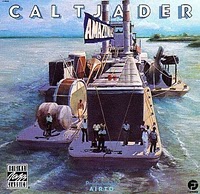 A great Brazilian set from Cal Tjader quite different than most of his other work of the time. Although Cal spent most of his time at Fantasy Records working in a mixture of jazz and Afro-Cuban styles, he steps off here in a very Brazilian 70’s mode one that has some great links with jazz trends going on in Brazil at the time. Production is by Airto and arrangements are by George Duke and there’s a wonderful crossing of Rio and California in the set – one that uses keyboards from Egberto Gismonti, flute from Hermeto Pascoal, guitars by David Amaro, and trombone from Raul De Souza. Dawilli Gonga aka george duke plays some especially nice keyboards on the set and titles include a great version of Joao Donato’s “Amazonas.” – orgyinrhythm
A great Brazilian set from Cal Tjader quite different than most of his other work of the time. Although Cal spent most of his time at Fantasy Records working in a mixture of jazz and Afro-Cuban styles, he steps off here in a very Brazilian 70’s mode one that has some great links with jazz trends going on in Brazil at the time. Production is by Airto and arrangements are by George Duke and there’s a wonderful crossing of Rio and California in the set – one that uses keyboards from Egberto Gismonti, flute from Hermeto Pascoal, guitars by David Amaro, and trombone from Raul De Souza. Dawilli Gonga aka george duke plays some especially nice keyboards on the set and titles include a great version of Joao Donato’s “Amazonas.” – orgyinrhythm
Randy Newman “12 Songs” (1970)
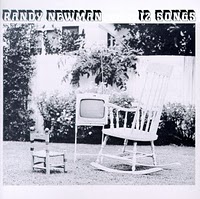 For me this was and still remains Randy Newman’s high water mark as a recording artist, the style and sound of the whole LP is sparse and as such rather menacing which suits the subject matter of these songs down to a tee but what makes this stand above other Newman classics (Sail Away, Good Old Boys, Trouble In Paradise) is that not before or since 12 Songs has Newman so convincingly stepped inside the skins of his dark, delusional characters, added to the fact there is not a single bad track on the whole record this stands for me as Neman’s Classic. –Derek
For me this was and still remains Randy Newman’s high water mark as a recording artist, the style and sound of the whole LP is sparse and as such rather menacing which suits the subject matter of these songs down to a tee but what makes this stand above other Newman classics (Sail Away, Good Old Boys, Trouble In Paradise) is that not before or since 12 Songs has Newman so convincingly stepped inside the skins of his dark, delusional characters, added to the fact there is not a single bad track on the whole record this stands for me as Neman’s Classic. –Derek
Williams And Watson “Two For The Price Of One” (1967)
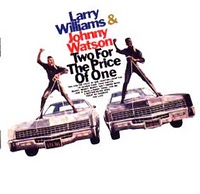 In the sixties there were thousands of soul sides produced, however, the market was singles driven, so finding a period soul album playable start to finish is tough. I know you might reckon, “What about Motown?”! If you own enough sixties era Motown albums you know exactly what I mean. Being the biggest soul label during the sixties they were VERY guilty of using “filler” tracks to pad the albums, often reusing backing tracks or having their artists sing standards. Well, fortunately, the genius of Mr. Larry Williams and Johnny ‘Guitar’ Watson defies the cliche’! Two For The Price Of One is a wide open, pedal to the metal…SOUL album…it’s exactly what you’d expect from this infamous pair…nothing but DANCERS! In fact, TftPoO is so danceable half the albums tracks are Northern Soul classics (biggest being “Too Late” and A “Quitter Never Wins”). This is what an album of soul oughta be…you ain’t heard NOTHING till you’ve heard this! –Nipper
In the sixties there were thousands of soul sides produced, however, the market was singles driven, so finding a period soul album playable start to finish is tough. I know you might reckon, “What about Motown?”! If you own enough sixties era Motown albums you know exactly what I mean. Being the biggest soul label during the sixties they were VERY guilty of using “filler” tracks to pad the albums, often reusing backing tracks or having their artists sing standards. Well, fortunately, the genius of Mr. Larry Williams and Johnny ‘Guitar’ Watson defies the cliche’! Two For The Price Of One is a wide open, pedal to the metal…SOUL album…it’s exactly what you’d expect from this infamous pair…nothing but DANCERS! In fact, TftPoO is so danceable half the albums tracks are Northern Soul classics (biggest being “Too Late” and A “Quitter Never Wins”). This is what an album of soul oughta be…you ain’t heard NOTHING till you’ve heard this! –Nipper
The Monks “Black Monk Time” (1966)
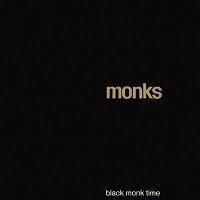 The story of the Monks is almost that of urban legend. Five U.S. G.I.s stationed in Germany in the 1960’s, decide to go AWOL from the military, begin dressing as monks and record an album of some of the most avant-garde rock n roll ever. Yes, it almost sounds too good to be true. I had heard the tale of these Monks when I picked up this wild little gem and it certainly lived up to the legend. Twelve amazingly off-kilter garage rock tunes that will surely grab your attention. The album starts of with “Monk Time” the band’s anthem and call to arms. The singer screams and squeals his montra of peace and rock n roll and invites you to become a monk and rock n roll with them. The album then kicks into gear with the raucous stomper “Shut Up” and the dancable organ-fueled “Boys Are Boys and Girls Are Choice”. The album then gets even more wild with the goofy but cathy “Higgle-Dy-Piggle-Dy” with its yodeling falseto. The album then takes a dark turn on the track “I Hate You” which is as menacing as the name implies. Just when the Monks got ya down, they bring you right back up a string of amazing garage rock rave ups. “Oh, How To Do Now” is the band’s most freakbeat dance song, with its great organ sound and catchy chorus, then the stomping sound of “Complication” slows it down a touch just before you’re treated to the wonderful “We Do Wei Du” and the amazingly sparatic “Drunken Maria” with its great call and response chorus. “Love Came Tumblin Down” is probably the Monks’ most straight forward song, with its standard singing style (no yelling, chanting or yodeling) it’s still a great song. The album then ends with “Blast Off” and “That’s My Girl”. All in all, this is a very cool, unique, bizzare and fun record. Anyone looking to hear some great 60’s garage rock that definitely isn’t from the standard mold, should seek out this obscure freaky classic. –KAM
The story of the Monks is almost that of urban legend. Five U.S. G.I.s stationed in Germany in the 1960’s, decide to go AWOL from the military, begin dressing as monks and record an album of some of the most avant-garde rock n roll ever. Yes, it almost sounds too good to be true. I had heard the tale of these Monks when I picked up this wild little gem and it certainly lived up to the legend. Twelve amazingly off-kilter garage rock tunes that will surely grab your attention. The album starts of with “Monk Time” the band’s anthem and call to arms. The singer screams and squeals his montra of peace and rock n roll and invites you to become a monk and rock n roll with them. The album then kicks into gear with the raucous stomper “Shut Up” and the dancable organ-fueled “Boys Are Boys and Girls Are Choice”. The album then gets even more wild with the goofy but cathy “Higgle-Dy-Piggle-Dy” with its yodeling falseto. The album then takes a dark turn on the track “I Hate You” which is as menacing as the name implies. Just when the Monks got ya down, they bring you right back up a string of amazing garage rock rave ups. “Oh, How To Do Now” is the band’s most freakbeat dance song, with its great organ sound and catchy chorus, then the stomping sound of “Complication” slows it down a touch just before you’re treated to the wonderful “We Do Wei Du” and the amazingly sparatic “Drunken Maria” with its great call and response chorus. “Love Came Tumblin Down” is probably the Monks’ most straight forward song, with its standard singing style (no yelling, chanting or yodeling) it’s still a great song. The album then ends with “Blast Off” and “That’s My Girl”. All in all, this is a very cool, unique, bizzare and fun record. Anyone looking to hear some great 60’s garage rock that definitely isn’t from the standard mold, should seek out this obscure freaky classic. –KAM
The Quick “Mondo Deco” (1976)
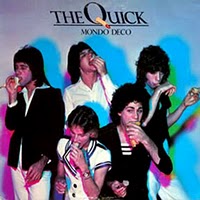 The Quick’s 1976 debut, and only, LP is hands down, no arguing allowed, the best powerpop album ever recorded. Song after song, side after side, this record delivers on so many levels it’s almost comical. Danny Wilde’s (yes, THE Danny Wilde from the Rembrandts who penned the ultra annoying ‘Friends’ theme song..) vocals are so high pitched they occasionally make Russell Mael from Sparks sound like Bowser from Sha-na-na. The guitar tone is pure glitter/punk and the drums and keyboards are trashy and pounding. Lovingly produced by Earle Mankey (Sparks, Dickies, 20/20, Paley Brothers) and Kim Fowley (everyone else in L.A.), this record truly is the sound of glitter and punk, on speed, colliding in the heat of Los Angeles. The lyrics are that perfect mix of gum chewing, over sexed, punk smartass and theater major, that somehow, when sang in a 14 year old girl falsetto, sound even more manly..(scientists are still scratching their heads at this phenomena…). Out of print for years on vinyl, and never legitimately issued on cd (aren’t major labels SO COOL??!!), masterpieces like this LP and Milk and Cookies one and only LP are finally available. Fans of old punk take note, the Dickies classic ‘pretty please me’ is a Quick cover. Between the shimmering beauty of Kimono My House and the golden pop culture trash heap that are the the first two Dickies LP’s lies this diamond. It does not need appraisal, its cuts speak for itself. –Richard
The Quick’s 1976 debut, and only, LP is hands down, no arguing allowed, the best powerpop album ever recorded. Song after song, side after side, this record delivers on so many levels it’s almost comical. Danny Wilde’s (yes, THE Danny Wilde from the Rembrandts who penned the ultra annoying ‘Friends’ theme song..) vocals are so high pitched they occasionally make Russell Mael from Sparks sound like Bowser from Sha-na-na. The guitar tone is pure glitter/punk and the drums and keyboards are trashy and pounding. Lovingly produced by Earle Mankey (Sparks, Dickies, 20/20, Paley Brothers) and Kim Fowley (everyone else in L.A.), this record truly is the sound of glitter and punk, on speed, colliding in the heat of Los Angeles. The lyrics are that perfect mix of gum chewing, over sexed, punk smartass and theater major, that somehow, when sang in a 14 year old girl falsetto, sound even more manly..(scientists are still scratching their heads at this phenomena…). Out of print for years on vinyl, and never legitimately issued on cd (aren’t major labels SO COOL??!!), masterpieces like this LP and Milk and Cookies one and only LP are finally available. Fans of old punk take note, the Dickies classic ‘pretty please me’ is a Quick cover. Between the shimmering beauty of Kimono My House and the golden pop culture trash heap that are the the first two Dickies LP’s lies this diamond. It does not need appraisal, its cuts speak for itself. –Richard
EPMD “Strictly Business” (1988)
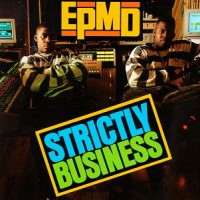
From all the rappers that came out in 1988, one of the more notable, influential and legendary is EPMD. Short for Erick and Parrish Making Dollars, the duo made up of Erick Sermon and Parrish Smith released their official debut album in 1988, named Strictly Business. As rappers, they do hardly anything more than bragging but their chemistry is so awesome and they have plenty of quotables and cool verses to rap to. They are not on the level of Rakim or Big Daddy Kane but they are pretty nice to listen to. The production for Strictly Business is what makes this album legendary though. Wanna see where funk in hip-hop got it’s start? Look no further than Strictly Business. You have heard songs like “Nastradamus”, “Ain’t No Nigga” and “Going Back to Cali”, right? Who do you think sampled them first? The answer is found right here with Erick Sermon. His funk inspired production is simply ahead of it’s time. Even though funk was a lot more popular in the west coast, it got it’s real start in Long Island with Erick Sermon. The funk samples are pretty simple and mostly looped on the songs but they are so awesome, they remain timeless. I can’t imagine this album being hailed as a classic had it not been for the great production. Funk in hip-hop got it’s real start right here (and alternatively on Life Is… Too Short from the same year). There’s also the original series of a story in song form with “Jane”, a hooker that never leaves the duo alone and would have a song dedicated to her in every EPMD followup. –Prt Cpt
Captain Beefheart “Safe as Milk” (1967)
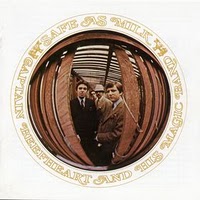 The debut album, “Safe as Milk,” begins to showcase the genius of Don Van Vliet (aka Captain Beefheart). The band’s trademark sound is already here beginning with Beefheart’s voice, one of the most recognizable and individual instruments in music. Next, the lyrics, which are abstract to say the least! Finally the music, a sort of weird extension of the blues blended with elements of free jazz and rock. This debut really only hints at what’s to come but it remains one of Captain Beefheart’s most enjoyable and accessible albums. –Jon
The debut album, “Safe as Milk,” begins to showcase the genius of Don Van Vliet (aka Captain Beefheart). The band’s trademark sound is already here beginning with Beefheart’s voice, one of the most recognizable and individual instruments in music. Next, the lyrics, which are abstract to say the least! Finally the music, a sort of weird extension of the blues blended with elements of free jazz and rock. This debut really only hints at what’s to come but it remains one of Captain Beefheart’s most enjoyable and accessible albums. –Jon
You haven’t really lived until you’ve heard “Sure ‘Nuff ‘n Yes I Do,” “Zig Zag Wanderer,” “Dropout Boogie,” Abba Zaba,” and “Plastic Factory!” “Safe As Milk” may be Beefheart’s most accessible album but it’s still weirder than almost anything else from the time – save maybe The Deviants or The Monks. –David
Swell Maps “A Trip to Marineville” (1979)
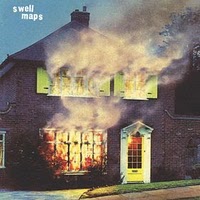 Say, that’s a swell map! Anarchic and juvenile in the best sense of the words, this stew of garage noise plays like an instruction manual for barely competent musicians with big record collections. It’s all over the map stylistically, beginning somewhere in classic UK punk territory before launching off into psychedelia, retrograde surf rock, drone, motorik kraut, and a lot of kitchen-sink clatter that lends the whole an ambience unlike almost anything in recorded music. These guys will try anything once (and sometimes two or three times, which in a few cases renders the record a little trying, unless you’re truly committed), and their knack for the deranged arrangement is a veritable textbook for the indie rockers who followed. Making a virtue of amateurism, they’ll put a wailing voice where you’d expect the guitar feedback or synthesizer on the krautpunk “Full Moon in My Pocket,” while on “Gunboats,” they ratchet up the tension simply by throwing shit around the studio. Other highlights include the opening manifesto of “H.S. Art,” the catchy “Harmony in Your Bathroom” (which sounds like Nirvana a decade before Nirvana), and the amazing centerpiece, “Midget Submarines,” which is a lock groove lullaby of post-punk fury framed by ambient piano/more shit flying around the studio. The bonus 7″ now available as bonus cuts on the CD reissue features the awesome surfpunk raga “Loin of the Surf” and “Doctor at Cake,” which sounds like a high-school talent show take on Live-Evil era Miles Davis. Everyone who hears this unhinged record might find themselves wanting to make a record of their own. Begin by throwing shit around the house. Try a little basket weaving for good measure. –Will
Say, that’s a swell map! Anarchic and juvenile in the best sense of the words, this stew of garage noise plays like an instruction manual for barely competent musicians with big record collections. It’s all over the map stylistically, beginning somewhere in classic UK punk territory before launching off into psychedelia, retrograde surf rock, drone, motorik kraut, and a lot of kitchen-sink clatter that lends the whole an ambience unlike almost anything in recorded music. These guys will try anything once (and sometimes two or three times, which in a few cases renders the record a little trying, unless you’re truly committed), and their knack for the deranged arrangement is a veritable textbook for the indie rockers who followed. Making a virtue of amateurism, they’ll put a wailing voice where you’d expect the guitar feedback or synthesizer on the krautpunk “Full Moon in My Pocket,” while on “Gunboats,” they ratchet up the tension simply by throwing shit around the studio. Other highlights include the opening manifesto of “H.S. Art,” the catchy “Harmony in Your Bathroom” (which sounds like Nirvana a decade before Nirvana), and the amazing centerpiece, “Midget Submarines,” which is a lock groove lullaby of post-punk fury framed by ambient piano/more shit flying around the studio. The bonus 7″ now available as bonus cuts on the CD reissue features the awesome surfpunk raga “Loin of the Surf” and “Doctor at Cake,” which sounds like a high-school talent show take on Live-Evil era Miles Davis. Everyone who hears this unhinged record might find themselves wanting to make a record of their own. Begin by throwing shit around the house. Try a little basket weaving for good measure. –Will
Tubeway Army “Replicas” (1979)
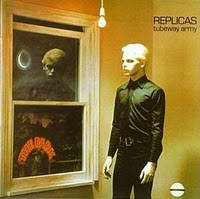 Numan’s best record is a dark and sleazy, yet oddly sensual and visionary album. The cold textures of the synthesizers are contrasted with crunchy rhythm guitar and punchy post-punk rhythms, properly making a virtue of the music’s simplicity to convey a stripped down sense of horror, alienation, and sordid pleasures. The bizarre lyrics have an imagistic quality that rounds out the mood and unifies the album beautifully. At least seven tracks here are classics: “Me! I Disconnect from You,” “Are ‘Friends’ Electric?,” “The Machman,” “Down in the Park,” “You Are in My Vision,” the title cut, and “It Must Have Been Years.” The final two tracks are moody instrumentals evocative of the diminishing humanity of the whole thing. Few hit records from the late-70s/early-80s are so unified and consistently compelling. And few synth-rock albums have such inviting textures. This is creepy post-punk that’s also as fun as a wad of bubble gum. Me! I recommend to you. –Will
Numan’s best record is a dark and sleazy, yet oddly sensual and visionary album. The cold textures of the synthesizers are contrasted with crunchy rhythm guitar and punchy post-punk rhythms, properly making a virtue of the music’s simplicity to convey a stripped down sense of horror, alienation, and sordid pleasures. The bizarre lyrics have an imagistic quality that rounds out the mood and unifies the album beautifully. At least seven tracks here are classics: “Me! I Disconnect from You,” “Are ‘Friends’ Electric?,” “The Machman,” “Down in the Park,” “You Are in My Vision,” the title cut, and “It Must Have Been Years.” The final two tracks are moody instrumentals evocative of the diminishing humanity of the whole thing. Few hit records from the late-70s/early-80s are so unified and consistently compelling. And few synth-rock albums have such inviting textures. This is creepy post-punk that’s also as fun as a wad of bubble gum. Me! I recommend to you. –Will


